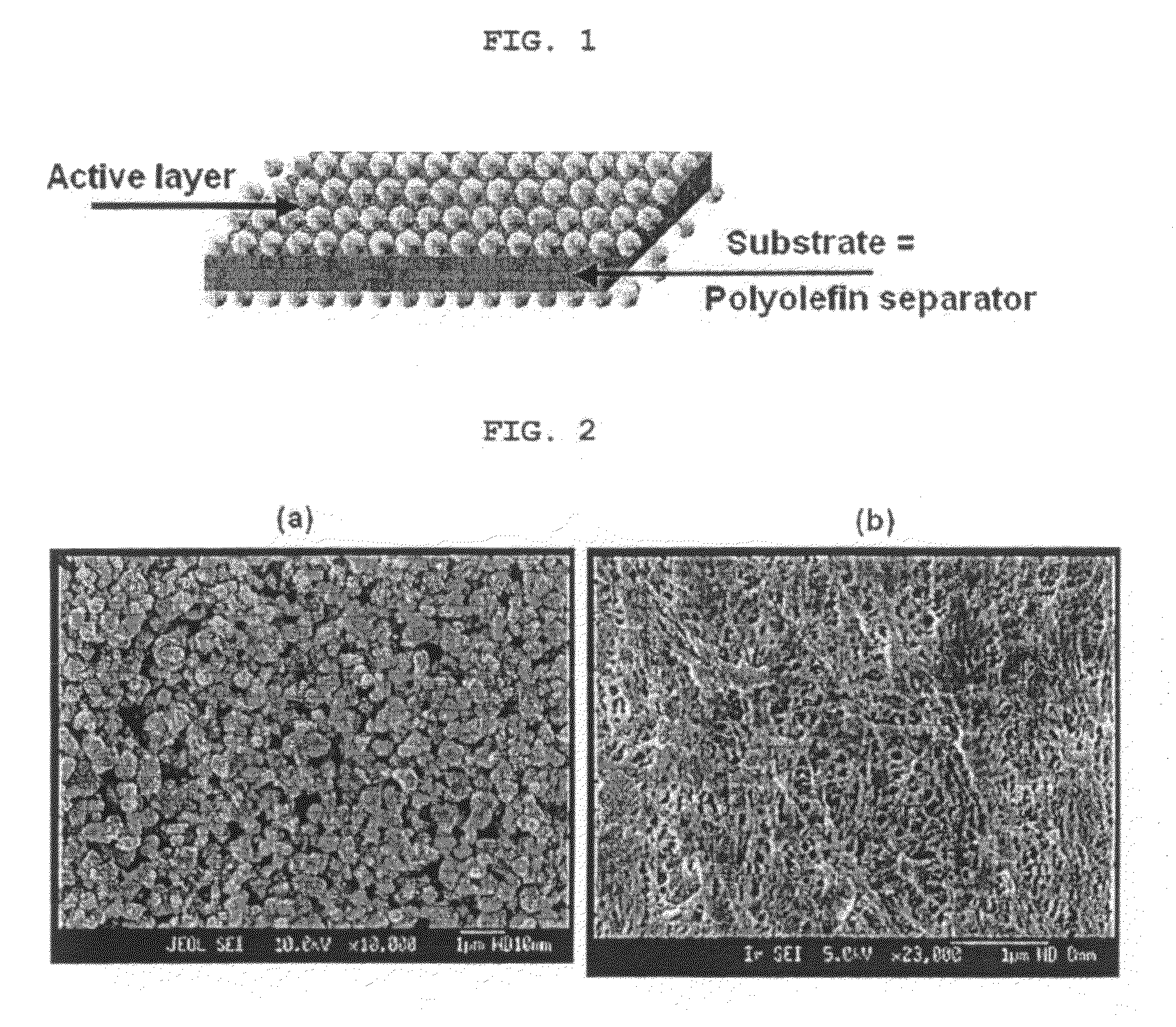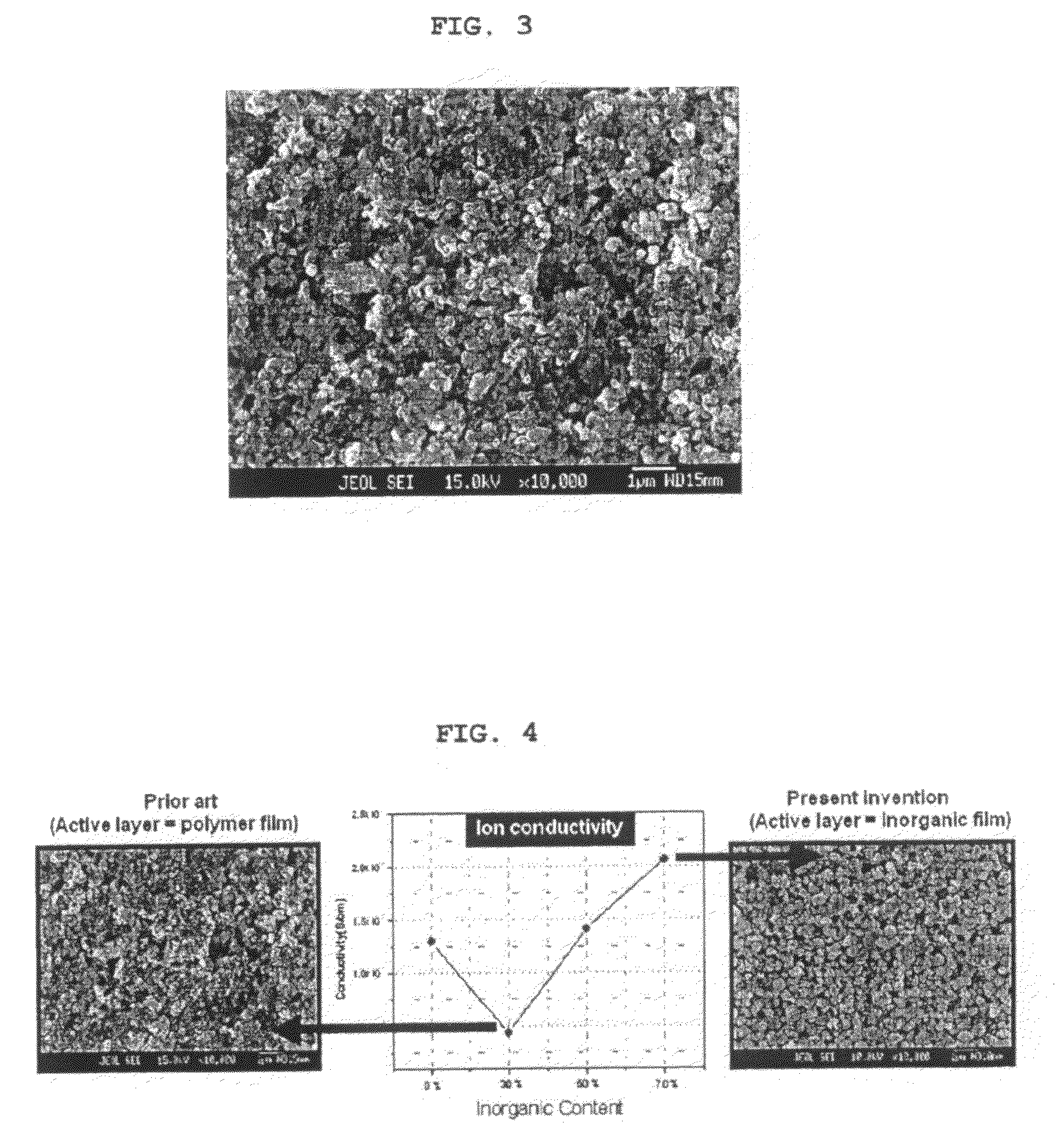Organic/inorganic composite microporous membrane and electrochemical device prepared thereby
a microporous membrane and organic/inorganic composite technology, applied in the field of organic/inorganic composite porous separators, can solve the problems of low capacity of secondary lithium ion polymer batteries compared to secondary lithium ion batteries, insufficient discharge capacity, safety problems, etc., and achieve easy assembly and assembly of batteries. , excellent adhesion of polymer
- Summary
- Abstract
- Description
- Claims
- Application Information
AI Technical Summary
Benefits of technology
Problems solved by technology
Method used
Image
Examples
example 1-7
Example 1
[0082]1-1. Preparation of Organic / Inorganic Composite Porous Separator (PVdF-CTFE / BaTiO3)
[0083]Polyvinylidene fluoride-chlorotrifluoroethylene copolymer (PVdF-CTFE) was added to acetone in an amount of about 5 wt % and dissolved therein at 50° C. for about 12 hours or more to form a polymer solution. To the polymer solution obtained as described above, BaTiO3 powder was added in an amount corresponding to the ratio of BaTiO3 / PVdF-CTFE=90 / 10 (wt % ratio). Next, the BaTiO3 powder was crushed and pulverized for about 12 hours or more by using a ball mill method to form slurry. The BaTiO3 powder in the slurry obtained as described above has a size controllable according to the size (particle size) of the beads used in the ball mill and the application time of the ball mill. In this example, the BaTiO3 powder was pulverized into a size of about 400 nm to provide the slurry. Then, the slurry obtained as described above was coated on a polyethylene separator (porosity: 45%) having...
example 2
[0091]Example 1 was repeated to provide an organic / inorganic composite porous separator (PVdF-HFP / BaTiO3) and a lithium secondary battery comprising the same, except that PVDF-HFP was used instead of PVDF-CTFE. After measuring with a porosimeter, the final organic / inorganic composite porous separator had a thickness of 3 μm, and showed a pore size of 0.4 μm and a porosity of 56%.
example 3
[0092]Example 1 was repeated to provide an organic / inorganic composite porous separator (PVdF-CTFE / PMNPT) and a lithium secondary battery comprising the same, except that PMNPT powder was used instead of BaTiO3 powder. After measuring with a porosimeter, the final organic / inorganic composite porous separator had a thickness of 3 μm and showed a pore size of 0.5 μm and a porosity of 57%.
PUM
| Property | Measurement | Unit |
|---|---|---|
| size | aaaaa | aaaaa |
| size | aaaaa | aaaaa |
| dielectric constant | aaaaa | aaaaa |
Abstract
Description
Claims
Application Information
 Login to View More
Login to View More - R&D
- Intellectual Property
- Life Sciences
- Materials
- Tech Scout
- Unparalleled Data Quality
- Higher Quality Content
- 60% Fewer Hallucinations
Browse by: Latest US Patents, China's latest patents, Technical Efficacy Thesaurus, Application Domain, Technology Topic, Popular Technical Reports.
© 2025 PatSnap. All rights reserved.Legal|Privacy policy|Modern Slavery Act Transparency Statement|Sitemap|About US| Contact US: help@patsnap.com



